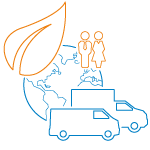ABB in summary

ABB is one of the world’s leading power and automation technology companies. We are present throughout the entire renewables value chain, from power generation to transmission, distribution and electric mobility.
Our portfolio ranges from switches and sockets to robots, and from large transformers to control systems that manage entire power networks and factories.
We provide solutions for secure, energy-efficient generation, transmission and distribution of electricity, and for increasing productivity in industrial, commercial and utility operations.
We help our customers meet their challenges with minimum environmental impact. That’s why ABB stands for “Power and productivity for a better world.”
Sustainability considerations cover how we design and manufacture products, what we offer customers, how we engage suppliers, how we assess risks and opportunities, and how we behave in the communities where we operate and towards one another, while striving to ensure the health, safety and security of our employees, contractors and others affected by our activities.
Our sustainability performance reporting is guided by the Global Reporting Initiative’s (GRI) G4 Guidelines. A summary table of numerical performance indicators is included. The independent assurance provider DNV GL has provided assurance of selected indicators and reviewed key data and claims in the report. Its assurance statement appears in chapter DNV GL assurance statement.

$41.5 billion
orders in 2014
$51% of revenues
related to energy efficiency and renewable energy

$9 million
spent on community projects in 2014
28 awards
for good corporate citizenship worldwide

$1.5 billion
invested in R&D in 2014
445 TWh energy
saved by ABB drives

company delivering power and productivity for a better world

500 managers
trained on human rights
94,000+ employees
trained on anti-bribery principles in 2014

employees
150nationalities

of water
saved through reuse and recycling
energy efficiency
projects under way

supply chain
assessments in 2014
critical suppliers trained
since 2011